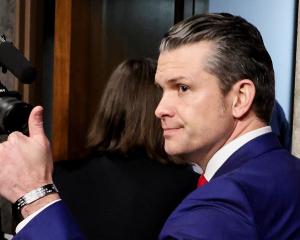
So will his leader, Christopher Luxon. Instead of Mr Uffindell basking in whatever dim glow his dull-as-ditch-water maiden speech produced last week, and Mr Luxon fizzing after the weekend’s buoyant party conference and this week’s encouraging poll results, both have been in damage control.

This revelation only became public because his victim, to whom he apologised last year, more than 20 years after the incident, spoke out about it to Stuff.
While he had accepted the apology in good faith at the time, he now felt it was more of an apology of convenience, designed to ensure the incident would not hamper Mr Uffindell’s political aspirations. Mr Uffindell has vehemently denied this.
The new MP was at pains to point out he gave a full account of the incident to the selection panel.
The party delegates who voted for him, however, were not privy to this information, and Mr Luxon says he only found out this week.
Voters were also in the dark. Although Mr Uffindell said that he thought the issue would come out during the election campaign, he did not mention it on occasions when he could have then, or in his maiden speech.
His minders did not seem to have a plan for how to deal with it if it emerged either.
Now Mr Uffindell has been suspended from caucus while a fortnight-long investigation is held into bullying allegations raised this week by a woman he flatted with in his second year at the University of Otago. The allegations are denied by Mr Uffindell.
None of this is a good look for National, when it is trying to convince voters of its new coherence after some turbulent years. It wants us to believe it is bringing itself into this century, and improving its chequered track record on selection, which has previously thrown up too many young male MPs who turned out to be duds.
Even without this scandal, it is hard to see Mr Uffindell, whose maiden speech said little about him and sounded like a reading from the National Party manifesto, cast in a modern mould and destined to forge a new path to diversity.
But he is the person the party chose, and now he is Mr Luxon’s headache. Before the Dunedin flat allegations surfaced, Mr Luxon stood by Mr Uffindell. The mantra then was Mr Uffindell is a reformed character and everyone deserves a second chance, although it was not necessarily easy to see this sentiment fitting with the party’s enthusiasm for being tough on crime.
Mr Luxon will be acutely aware that should this end in Mr Uffindell’s departure, his party, which has been banging on about wasteful Government spending, would cop criticism that its poor practices have been responsible for the expense of a by-election.
The 1News Kantar Public Poll, which Mr Luxon might have preferred to talk about this week, showed National, although it was down slightly on the previous poll, could govern with the help of Act New Zealand. If transferred to an election, the poll results would give National 48 seats and Act 14 (it has 10 now). Labour would not be able to muster enough support for a majority even with the support of the Greens and Te Pati Maori.
National sending more of the 11% of undecided voters to Act because it is still not seen to have its act together is not the outcome Mr Luxon will be hoping for after Mr Uffindell’s fate is known.













